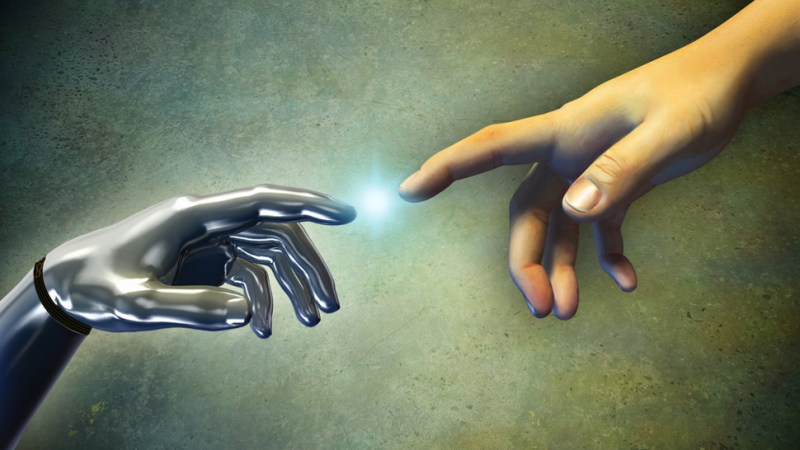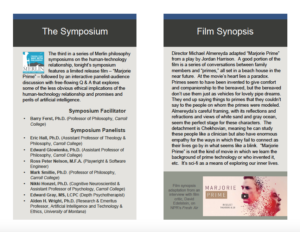 Co-directed by Merlin CCC (in conjunction with Tim Holmes, local and internationally-renowned artist, and Pastor Russ Danaher, ADA Coordinator, Montana Department of Corrections, and Ross Peter Nelson, MFA & Software Engineer), “Vulnerable Humanity, Predictable Machines” (Part 3) was the third of three community events geared to initiate a public discussion about the human-technology relationship and the promises and perils of artificial intelligence (AI). The symposium took place in the auditorium at The Myrna Loy Center on Wednesday, Nov. 8th 2017.
Co-directed by Merlin CCC (in conjunction with Tim Holmes, local and internationally-renowned artist, and Pastor Russ Danaher, ADA Coordinator, Montana Department of Corrections, and Ross Peter Nelson, MFA & Software Engineer), “Vulnerable Humanity, Predictable Machines” (Part 3) was the third of three community events geared to initiate a public discussion about the human-technology relationship and the promises and perils of artificial intelligence (AI). The symposium took place in the auditorium at The Myrna Loy Center on Wednesday, Nov. 8th 2017.
View the symposium by clicking the play button on the video below.
Symposium Theme
In our first symposium we discussed the human-technology relationship and the promises and perils of artificial intelligence in terms of some of the less emphasized properties of the human spirit — namely, our propensity to be vulnerable, unpredictable, arbitrary, and at times, unreasonable. The suggestion was that it was these things (not our ability to reason) that make material reductionism nonsensical and, thus save humanity from a life of artificial robotic realities. Watch/Listen to Symposium 1.
In our second symposium, we continued our investigation of the human-technology relationship. Panelists first explored some of the uses and meanings of vulnerability, as well as its relationship to the human spirit. They then considered various visions of our future technological world (is there reason to be optimistic? pessimistic?) and looked at some of the ethical implications posed by an increasingly technology-dependent and artificially-intelligent world. Specifically, what are some of the less obvious implications of our technologies and all-connected network when viewed as extensions of ourselves? And what do our creations say about us and where we’re going? Watch/Listen to Symposium 2.
 In this symposium, we continued our investigation of the aforementioned in conjunction with the viewing of a limited-release film, Marjorie Prime (view the film synopsis and event program by clicking on the image to the right & view the film trailer by scrolling to the bottom of this page and clicking the play button on the trailer video).
In this symposium, we continued our investigation of the aforementioned in conjunction with the viewing of a limited-release film, Marjorie Prime (view the film synopsis and event program by clicking on the image to the right & view the film trailer by scrolling to the bottom of this page and clicking the play button on the trailer video).
A large emphasis was placed on the “relational” aspect of “being human” (e.g., how we experience the world around us, relate with ourselves, relate with others, and the role that vulnerability plays in all of this). In the process, classic conundrums related to memory, consciousness, and emotion were discussed, as well as many of the less obvious ethical implications associated with the creation and use of artificial intelligence in our day-to-day lives.
Audio/Video of the Symposium
Our Panel
Our free-flowing Q & A-style symposium was moderated by Dr. Barry Ferst, Ph.D. (Professor of Philosophy, Carroll College) and featured guest panelists: Eric Hall, Ph.D. (Assistant Professor of Theology & Philosophy, Carroll College), Edward Glowienka, Ph.D. (Assistant Professor of Philosophy, Carroll College), Ross Peter Nelson, M.F.A. (Playwright & Software Engineer), Mark Smillie, Ph.D. (Professor of Philosophy, Carroll College), Nikki Honzel, Ph.D. (Cognitive Neuroscientist & Assistant Professor of Psychology, Carroll College), Edward Gray, MS, LCPC (Depth Psychotherapist), and Alden H. Wright, Ph.D. (Research & Emeritus Professor, Artificial Intelligence, Cultural Evolution, and Technology & Ethics, University of Montana).























Thank you to the Helena community, our guest panelists & moderator, the Carroll College Philosophy Department, Student Activities & Leadership & Hunthausen Center for Peace & Justice, The Myrna Loy Center, The Last Chance New Play Fest, Helena Civic Television, and The Depth Psychology Alliance!
Thank you also to our volunteers, Ryan Aikin, Gwen Sinisig and Steve Palmer and to Michael Chapman for photographing our event (see photos below)!
Huge thank you’s to P.L.A.T.O. (Philosophy Learning & Teaching Organization) for helping us to make our Philosophy in the Community programs like these available. We thoroughly appreciate your support!
Some Additional Resources
- Being Human in the Age of Intelligence (An interview with M.I.T. physics professor and author of Life 3.0: Being Human in the Age of Intelligence)
- Artificial Intelligence, Artificial Immortality, and Dad (An interview with James Vlahos on the creation of his Dadbot)
